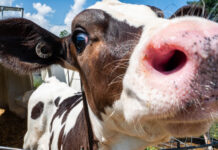As the journey by covered wagon unfolds for Laura Ingalls Wilder, her husband and young daughter, Rose, it becomes apparent that the travelers will be glad to settle down in a new home.
“The road goes up hill and down, and it is rutted and dusty and stony but every turn of the wheels changes our view of the woods and the hills,” Mrs. Wilder writes in her diary, compiled in to a book titled On The Way Home
“The sky seems lower here, and it is the softest blue. The distances and the valleys are blue whenever you can see them. It is a drowsy country that makes you feel wide awake and alive but somehow contented.”
Courage, blind faith. I am amazed at the courage and blind faith exhibited by people who set out on such life-changing journeys at a time when so little was actually known about the world they were entering. It is this wide-open possibility, and true curiosity, that prompted them to move onward every day.
“We went through a little station on the railroad and a few miles farther on we came to a fruit farm of 400 acres. A company owns it. There are 26,000 little young trees already set out in rows striping the curves of the land, and the whole 400 acres will be planted as soon as possible. Acres of strawberries and other small fruit are in bearing.
“We stopped to look our fill of the sight and Manly fell into conversation with some of the company’s men. They told him of a 40 he can buy for $400, all cleared and into grass except five acres of woods, and with a good ever-flowing spring, a comfortable log house and a barn.”
They kept going. The possibilities were endless, it seemed. The daily diary entries detailed one available farm after another. And yet, they continued on, bound for Mansfield, Missouri.
On Aug. 30, 1894, she writes, “We are passing through the Memphis fruit farms, 1,500 acres, part of the way on both sides of the road. It is a young orchard, rows upon rows of little trees …
“Some covered wagons came up behind us and we came up behind some ahead, all the teams going slowly, holding back down hill and pulling up hill. At 11:30 we came in to Mansfield in a long line of 10 emigrant wagons.
“Mansfield is a good town of 300 or 400 inhabitants in a good central location where it should grow fast. The railroad runs on one side of the square and two stagecoach lines go from the depot … there are churches, a good school, two general stores, two drug stores, the bank, a Boston Racket store, livery stable, blacksmith shop near.”
Hardship camping. The family camped in a woods for a long time while searching for a suitable farm on which to settle. Years later, when Rose mentioned the camp in the now-vanished woods, her mother would stop her with a fierce, “I don’t want to think about it!”
Settling in. The family finally settled in to a cozy cabin, their horses safe in a small barn, their hens that had made the long journey with them tucked in to a new little coop, and the diary notes expressed happiness in being able to purchase a milk cow.
The family endured many challenges, and eventually planned and built a new home, constructed from materials grown on their own farm, under a great old white-oak at the edge of a hill. Rose closes this little book with this:
“While I scattered corn for the hens, fetched water from the spring to fill their pans, and hunted for eggs that the broody hens hid in the hay mow, in the straw stack, and even in the wild grasses, I heard my mother whistling in the cabin, getting supper.”
A happy ending. Who could ask for anything more?
Get 4 Weeks of Farm and Dairy Home Delivered












